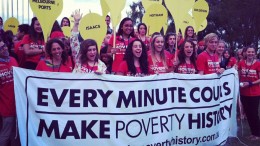Christian and secular organisations have come together in a ‘Movement to End Poverty’, seeking to keep the government’s commitment to overseas aid on the national agenda in the lead up to the federal election.
Micah Challenge, a movement of Christian agencies, churches and individuals is working with the Make Poverty History coalition, with 1000 young Australians from both groups gathering on the front lawns of Parliament House to launch their joint campaign this week.
It’s not the first time Micah Challenge has teamed up with Make Poverty History, and it probably won’t be the last, says Micah’s national coordinator, John Beckett.
“We have a long history working together and tend to plan our policy objectives together. We’ve got different constituencies but when we’re talking to politicians, we speak together to focus on what we’re asking for.”
The Movement to End Poverty is aiming to collect 500,000 signatures on its petition calling for Australia to contribute its “fair share of aid – just 70 cents in every $100 of Australia’s national income by 2020.”
Last year’s Budget came as a disappointment to the cause, with the federal government postponing by one year its planned foreign aid commitment to reach 0.5 percent of gross national income (50c in the dollar) by 2015. The government is now aiming for a 2016 commitment, saving $2.9 billion over the next four years.
Beckett says that’s not good enough, and in amongst hot political potatoes like media regulation, education reform and the National Disability Insurance Scheme, foreign aid still rates more than a passing mention.
“Since 1990 we have globally halved the number of people living under the extreme poverty line of less than US$1.25 a day,” he says. “If countries such as ours step up and do our bit, we can eradicate extreme poverty in our lifetime.”
It’s a familiar message now – spouted by the likes of Bono at TED 2013, and emblazoned on t-shirts and Pinterest boards. The movement’s activists in Australia show up regularly on the lawn of Parliament House with placards and petitions. But will it make a difference?
“It’s sometimes very effective, but always very important,” says Beckett. “If you’re not there, your issue is very easily forgotten. Just being there regularly is to remind the 226 politicians who sit there that you’re still around and that they need to be considering your issues.”
Perseverance is what’s needed in this movement, says Beckett. It’s a long road to end poverty (the campaign began 8 years ago), so keeping the momentum can be tough. However, Beckett says despite the length of the campaign, and the size of the problem, support continues to grow. He uses Micah’s Finish The Race initiative, one which alludes to 2 Timothy 4:7 – keeping faith with Jesus and fighting “the good fight” – to remind people of the need to continue in the call to end poverty.
“As Christians we’ve got a responsibility to continue to run the race, to fix our eyes on Jesus. We’ve found that the interest and support for the campaign always has cycles, but it does continue to grow.”
You can sign the Movement to End Poverty petition here.
Email This Story
Why not send this to a friend?




